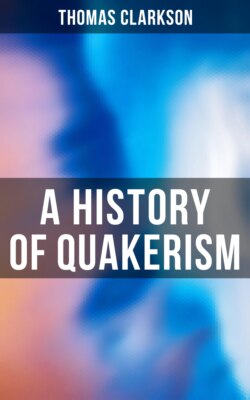Читать книгу A History of Quakerism - Thomas Clarkson - Страница 24
На сайте Литреса книга снята с продажи.
CHAP. V. … SECT. I.
ОглавлениеTable of Contents
Dancing forbidden—Greeks and Romans differed on this subject—motive on which the Greeks encouraged dancing—motive on which the moderns encouraged it—way in which the Quakers view it—the arguments which they use against it.
As the Quakers have thought it right to prohibit music, and stage-entertainments, to the society, so they have thought it proper to prohibit dancing, none of their children being allowed any instruction in the latter art.
It is remarkable that two of the most civilized nations, as well as two of the wisest men of antiquity, should have differed in their opinions with respect to dancing. The Greeks considered it as a wise and an honourable employment; and most of the nations therefore under that appellation inserted it into their system of education. The name of dancer was so honourable, as to be given to some of their gods. Statues are recorded to have been erected to good dancers. Socrates is said to have admired dancing so much, as to have learnt it in his old age. Dancing, on the other hand, was but little regarded at Rome. It was not admitted even within the pale of accomplishments. It was considered at best as a sorry and trivial employment. Cicero says,
"Nemo, fere saltat sobrius, nisi forte insanit, neque in solitudine, neque in convivio honesto." That is, "No man dances, in private, or at any respectable entertainment, except he be drunk or mad."
We collect at least from the above statement, that people of old, who were celebrated for their wisdom, came to very different conclusions with respect to the propriety of the encouragement of this art.
Those nations among the ancients, which encouraged dancing, did it upon the principle, that it led to an agility of body, and a quickness of motion, that would be useful in military evolutions and exploits. Hence swiftness of foot was considered to be an epithet, as honourable as any that could be given to a warrior.
The moderns, on the other hand, encourage dancing, or at least defend it upon different principles. They consider it as producing a handsome carriage of the body; as leading to a graceful and harmonious use of the limbs; and as begetting an erectness of position, not more favourable to the look of a person than to his health.
That dancing produces dispositions of this sort cannot be denied, though certainly not to the extent which many have imagined. Painters, who study nature the most, and are the best judges of the appearance of the human frame, are of opinion, that modern dancing does not produce natural figures or at least such as they would choose for their respective compositions. The military exercise has quite as great a share as dancing in the production of these dispositions. And there are certainly men, who were never taught either the military exercise or dancing, whose deportment is harmonious and graceful.
The Quakers think it unnecessary to teach their children dancing, as an accomplishment, because they can walk, and carry their persons with sufficient ease and propriety without it.
They think it unnecessary also, because, however the practice of it may be consistent with the sprightliness of youth, they could never sanction it in maturer age. They expect of the members of their society, that they should abandon amusements, and substitute useful and dignified pursuits, when they become men. But they cannot consider dancing but as an employment that is useless, and below the dignity of the christian-character in persons, who have come to years of discretion. To initiate therefore a youth of twelve or thirteen years of age into dancing, when he must relinquish it at twenty, would, in their opinion, be a culpable waste of his time.
The Quakers, again, cannot view dancing abstractedly, for no person teaches or practises it abstractedly; but they are obliged to view it, in connection with other things. If they view it with its usual accompaniment of music, it would be inconsistent, they think, to encourage it, when they have banished music from their republic. If they view it as connected with an assemblage of persons, they must, they conceive, equally condemn it. And here it is in fact, that they principally level their arguments against it. They prohibit all members of their society from being present at balls, and assemblies; and they think, if their youth are brought up in ignorance of the art of dancing, that this ignorance will operate as one preventative at least against attendances at amusements of this nature.
The Quakers are as strict in their inquiry with respect to the attendances of any of their members at balls, as at theatrical amusements. They consider balls and assemblies among the vain amusements of the world. They use arguments against these nearly similar to those which have been enumerated on the preceding subjects.
They consider them in the first place, as productive of a kind of frivolous levity, and of thoughtlessness with respect to the important duties of life. They consider them, in the second place, as giving birth to vanity and pride. They consider them, again, as powerful in the excitement of some of the malevolent passions. Hence they believe them to be injurious to the religious interests of man; for, by depriving him of complacency of mind, and by increasing the growth of his bad feelings, they become impediments in the way of his improvement as a moral being.
